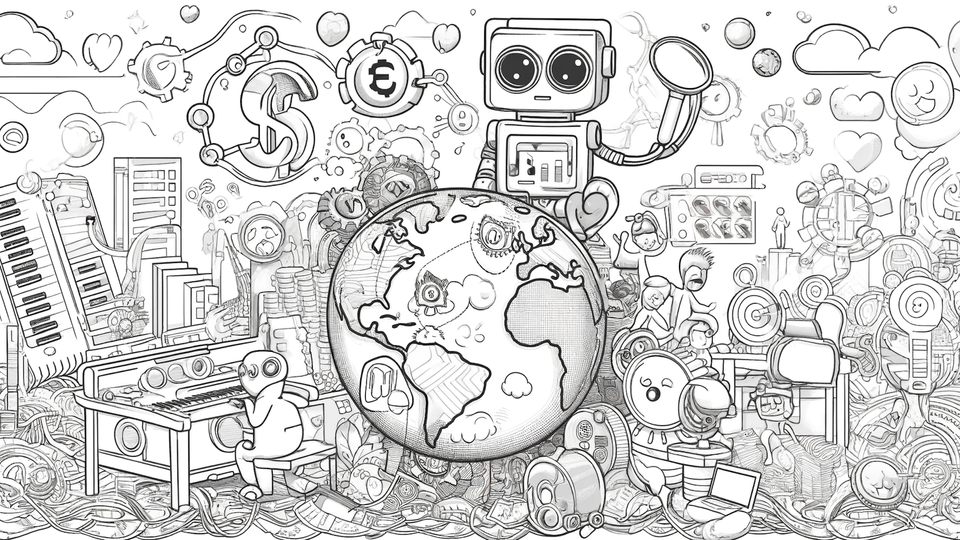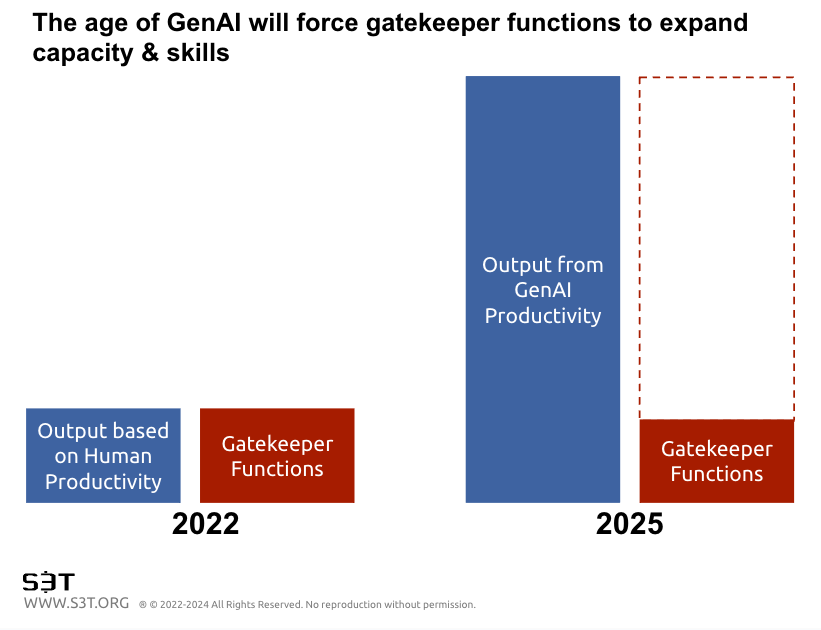🦉S3T Apr 5 2024: Debt, Retirement, Suno.AI, DePIN, Decentralized AI, GenAI & Workforce shifts: 4 Leadership priorities

Welcome to S3T, the essential newsletter, podcast, and learning platform for change leaders. Every week we review the top developments and insights you need to stay ahead of the curve, build your ethics & leadership skills, and drive intentional beneficial innovation.
🎧 Listen to this episode on the S3T Podcast - Be sure to follow the S3T podcast so you never miss a show!
In this edition of S3T:
🌏 Global Financial Outlook: 88% of financial simulations predict a bleak future for the US economy due to increasing debt. The Japanese Yen might hit new lows if the Fed doesn't cut interest rates in 2024, according to Bank of America.
🎵 Suno.AI: AI Music Generation: Suno.AI creates "hit songs" from text prompts, offering up to 500 songs a day for $8/month, challenging traditional music production economics. While not aiming to replace artists, Suno.AI represents a shift towards hyper-personalization in music, amidst ethical and legal debates.
🚀 AI & Blockchain Developments Interest grows in Decentralized Physical Infrastructure Networks (DePIN) and Decentralized AI, suggesting a future less dominated by Big Tech.
🤖 Generative AI & Workforce Shift: This week's S3T Playbook highlights an imminent flood of productivity from GenAI, forcing a shift in workforce composition towards more effective gatekeeping roles.
Opinions expressed are those of the individuals and do not reflect the official positions of companies or organizations those individuals may be affiliated with. Not financial, investment or legal advice. Authors or guests may hold assets discussed.

The magic number this week is 88
- The average US saver has 88K in savings. Conventional wisdom suggests $1.5M is needed for adequate retirement savings.
- 88% of financial simulator scenarios showed negative outcomes for US future economy as debt grows.
Elsewhere:
- Trouble for the Yen - Bank of America projections suggest the Japanese Yen may slide to new lows if the Fed doesn't cut interest rates in 2024.
- Debt continues to hamper low income countries globally though markets outlooks are improving (IMF Report).


Creators of Suno.AI, a scarily convincing AI music generator, says they don't want to replace artists
Suno.AI generates "hit songs" including lyrics and recording studio vocals and instrumentals from text prompts indicating a music genre, mood, and a few topical words. The sound quality is impressive. The melodies and lyrics are - well - what you'd expect from a GenAI output...a little hokey and not all there.
The subscription plans as explained by Tech Radar here offer an interesting insight into the differential between the productivity costs of GenAI vs human creators :
- The free plan let's you generate 10 songs a day - no artist has ever kept up that pace
- The Pro plan at $8 per month lets you generate 500 songs a day - no record label can compete with those kind of economics.
This offers a glimpse of the kind of hyper-personalization at scale that is currently beyond the reach of human-based creativity...at least the way it's organized currently.
Just waiting for those lawsuits...
Rolling Stone magazine tried to delve into the big question: what was this trained on? The founders refuse to disclose that, though their comments do suggest they fully expect to be sued. The team also says they aren't trying to replace musicians; they just think that there are lot of people out there who would like to generate songs for fun. The future version of the Jukebox, minus a music industry. In cloud teams we talk about Infrastructure as Code (IaC for the cool kids). This sounds like Record Label as Code.
Two kinds of potential impact
- Impact to the music industry: Some will say the music industry with its long tradition of predatory treatment of musicians, and dumbing down of fan music choices in pursuit of profit is finally getting the judgement day it always deserved. Maybe. But this could have a negative impact to many hard working musicians as well.
- Impact to everyone who loves and creates music: There is a difference between watching a YouTube video of someone hiking the Grand Canyon vs actually hiking the Grand Canyon. One is creating and participating in an experience, the other is consuming a depiction of the experience. There is likewise a difference between generating a song from a prompt vs. holding a guitar in your hand and working out a new song chord by chord - along with its lyrics, and then finally being able to play that song to an appreciative audience. People who know that difference may be in the minority, but they will probably not ever choose a prompt-driven existence over the experience of being a creator.
On the other hand, for every songwriter out there who wonders what their song would sound like if it had some additional instruments or backup vocals that they can't afford to hire, or can't seem to find at the moment, tools like this one put them one step closer to at least seeing what that would be like.
Ethics perspectives
The ethical landscape surrounding the integration of Generative AI (GenAI) in the music industry is complex, touching upon concerns of industry equity and the authentic essence of musical creation. For musicians, legal professionals, and industry leaders committed to navigating these uncharted waters ethically, it's important to critically assess both the potential harms and benefits.
- GenAI could exacerbate the industry's historical challenges, including the exploitation of artists and could marginalize human creativity and effort.
- But it also could offers unprecedented opportunities for artistic enhancement and accessibility, allowing musicians to experiment with sounds and compositions beyond their immediate capabilities or resources.
Change leaders will want to find ways to respect and preserve the integrity of musical creation while mitigating the risks—like unfair treatment of musicians and dilution of the creative process. This approach could foster an industry that is more innovative, more inclusive and equitable.
AI & Blockchain Developments...
- AI & Blockchain Convergence is getting noticed in the mainstream press, as DePIN (Decentralized Physical Infrastructure Networks) attracts investor interest.
- The related concept of Decentralized AI gives some hope for an AI future liberated from the control of Big Tech.

S3T Playbook: Shift to effective gatekeeping in the age of generative AI

The world's supervisory workloads are about to explode and our staffing models are not ready.
The S3T edition for December 11, 2022 noted that the rise of GenAI would usher in a flood of productivity. We're now living in that reality. Between now and 2025 proactive companies and talent recruiters have the opportunity to facilitate a major if not once-in-a-lifetime shift in the composition of the workforce.
Background
There is a broad category of work today that exists across multiple industries and disciplines that we could categorize under the heading "gatekeepers" or "approvers."
Together these roles are responsible for a supervisory workload: reviewing, testing, scrutinizing, inspecting work products, documents, and deliverables before allowing them to progress to the next step, or be used in real world situations. Making sure that things work the way the should and comply with best practices or laws.
These roles have job titles that contain terms like "Quality Control", "Editor", "Compliance", "Security", "Testing", "Auditor" or "Governance." They include jobs that are responsible to check words, documents, media, code, processes and usability.
The work of these roles can range from product review to code review, document review and more. What gets reviewed could be AI models that require approval from an ethical or clinical governance team before they’re used in production. It could be documents or presentations that need to be approved before they are accepted or presented.
Current supervisory/gatekeeping capacity is sized for the productivity of the old world, not the new
These gatekeeper and approval roles carry a supervisory workload that has been matched over time to the expected output of the human workers producing things that require review or approval. The current staffing for these roles is sized to match expected outputs from human teams - not GenAI.
Current staffing for these gatekeeper roles is generally believed to be barely adequate for current levels of output, and organizations frequently complain that gatekeeper roles cause bottlenecking and delays to key initiatives.
This situation is about to get a lot worse. Going forward, gatekeeper roles will have:
- more to review - much more,
- less time to review it in,
- more complex criteria to review against.
The world's focus has been on production, with inspection & gatekeeping being largely an underfunded afterthought
In our modern economy to date, success has been defined in terms of higher productivity at lower cost. Safety, integrity and compliance is ignored until demanded by legal penalties or consumer backlash. Everything in our economy is geared to rewarding higher productivity at lower cost. GenAI appears to be making making this market principle irrelevant.
The problem of increasing productivity - at least for digital products and the knowledge economy - is now solved. GenAI tools can produce in 1 hour more material, media, content, words and software code than a human could read, consume or review in a month.
But this increased level of output should be thought of as digital raw material that requires inspection, correction and refinement before it can be turned into a safe usable product or service.
From now on, the primary problem of the digital economy will be how to process this digital raw material and turn it into something safe, ethical and useful.
- Setting standards and methods for implementing and enforcing them.
- Setting and managing processes that review, refine and approve.
- Deciding what is worth inspecting and correcting vs what is best deleted.
- Owning and operating processes for intervening in the AI product delivery lifecycle or data supply chains in order to improve GenAI or LLM outputs.

Member discussion